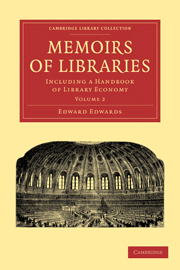Book contents
- Frontmatter
- Contents
- Chapter XV The Older Libraries of English Towns, and Their Management By Munic
- Chapter XVI The Parochial and Quasi-Parochial Libraries of England
- Chapter XVII The History of The “Public Libraries Acts” of 1850 and 1855
- Chapter XVIII The Working of The Public Libraries Acts of 1850 and 1855
- Appendix to Volume I
- Part The First. History of Libraries (Continued.)
- Book IV. The Libraries of The United States of America
- Book V. The Modern Libraries of Continental Europe
Chapter XII - Past, Present, and Future
Published online by Cambridge University Press: 29 August 2010
- Frontmatter
- Contents
- Chapter XV The Older Libraries of English Towns, and Their Management By Munic
- Chapter XVI The Parochial and Quasi-Parochial Libraries of England
- Chapter XVII The History of The “Public Libraries Acts” of 1850 and 1855
- Chapter XVIII The Working of The Public Libraries Acts of 1850 and 1855
- Appendix to Volume I
- Part The First. History of Libraries (Continued.)
- Book IV. The Libraries of The United States of America
- Book V. The Modern Libraries of Continental Europe
Summary
“As Years are running past us, let us throw something on Them which They cannot shake off in The dust and-hurry of The world, but must carry with Them to that great year of all, whereunto The lesser of this mortal life do tend and are subservient.”
LandOKR Citation of Shakespeare,1835, 146.)In casting a retrospective glance along The path we have trodden, three things strike me as standing out somewhat prominently from The rest. The first, that both here in Britain, Europe, The world owes to The Clergy,—Protestant or Romanist,— a majority of those literary storehouses, whose rise and growth have been narrated in These pages. The second, that The comparative inferiority of our own country (even to States of far subordinate rank), in respect of The public provision of Libraries, although it be an indubitable historical fact, is now in a fair way to become an historical fact only. The third, that recent experience in The History of Libraries, wheTher it be British, American, or Foreign, points, alike and unmistakeably, to The conclusion that for The Libraries of The Future we must mainly look to The local action of Towns; but to that, only in constant combination with national furTherance, and with national supervision. Each of These three inferences from The facts which have been adduced, may claim a few words of illustration.
I. Recognition of The fact that to The great Churchmen— using The word in its broadest sense—of mediaeval and of modern times, we owe most of our Libraries, is both honest gratitude and forecasting policy. It looks onward as well as backward. The Clergy—Roman, or Anglican; “Established”, or “Dissenting”,—are and must be, as a body, conservative. To err raTher on The side of an overweening reverence for The past, than of a conceited elation at The present, is of The essence of The ecclesiastical spirit, but is not one whit less of The essence of The love of literature. In order to build up a worthy Library it is, above all things, needful to have a loving veneration for The good men, for The good deeds, and even veneration for The good men, for The good deeds, and even for The misdirected aspirations, of ages long gone bye.
- Type
- Chapter
- Information
- Memoirs of LibrariesIncluding a Handbook of Library Economy, pp. 556 - 566Publisher: Cambridge University PressPrint publication year: 2010First published in: 1859

